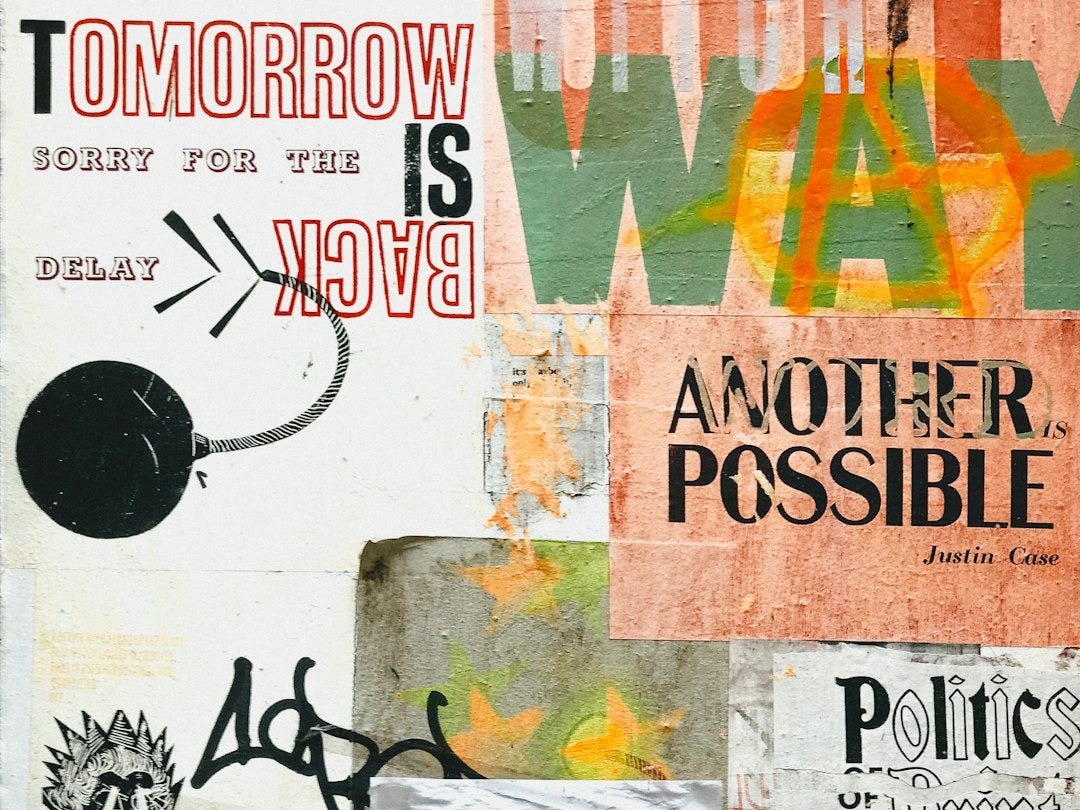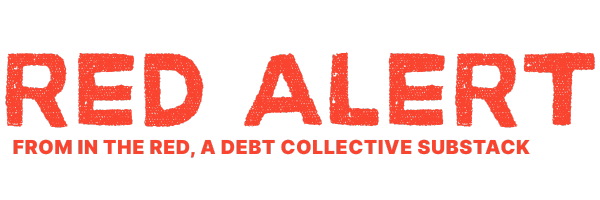Red Alert - October Edition
It’s not just you — we’re in an economic crisis. Here's what debtors are doing to fight back.
Welcome to the Substack edition of Red Alert. Each month, we’ll bring you key updates from our campaigns on higher education, housing, and medical debt—plus ways to get involved, take action, and join upcoming events.
By the way, a big welcome to our new subscribers! Your support means the world to us. Donations help, but even a like, share, or comment makes a real impact. Thanks for being here. We’re excited to keep sharing posts that inform, inspire, and engage debtors and our allies—far and wide.
“The ultimate, hidden truth of the world is that it is something that we make, and could just as easily make differently.” – David Graeber
Between skyrocketing healthcare premiums, the impending suspension of SNAP benefits, and the looming student loan default cliff, consumer debt in the U.S. has reached record levels. Nearly a quarter of borrowers using “buy now, pay later” services like Klarna and Afterpay are taking out loans just to pay for groceries. In the absence of public goods and services, private credit has filled the gap, forcing households to borrow to cover basic costs like housing, education, and healthcare. Meanwhile, the Trump administration’s recent move to prevent states from removing medical debts from credit reports hurts working-class people and only benefits debt collectors.
To be clear, we don’t think it should be easier for people to go into debt to afford food, housing, education, and healthcare — we think these public goods should be free and accessible to everyone. Judging by the popularity of Zohran Mamdani’s NYC mayoral campaign to provide New Yorkers with affordable childcare, free transit, rent freezes, and city-run grocery stores, many Americans think so too. Weathering this economic crisis will require new levels of solidarity, mutual aid, and collective action—but as debtors, we have the power to organize for a system that serves us, not the other way around.
Read on for updates on what we’ve been working on across higher education, medical, and housing debt, and upcoming events where you can learn more and take action.
Higher Education
The COVID payment pause proved that the government doesn’t actually need anyone to pay back their student loans, and all of those loans could have been cancelled. Instead, Biden chose to restart payments and Trump’s budget bill has hiked up payments for millions of student debtors. Since student loan payments resumed, record numbers of borrowers haven’t been able to afford to make payments. After 270 days, the accounts of borrowers who can’t pay officially go into default. This is what policy wonks call the default cliff, and it is here.
Never before have we seen so many people default in history. It’s time to organize, strategize, and find ways to protect ourselves and fight back. Join us for next week’s Higher Ed monthly call, where we’ll share updates to help student debtors navigate the upcoming default cliff.
Medical Debt
As the Trump administration continues to drum up xenophobic, hateful lies about how immigrants use the healthcare system because they think it will allow them to take healthcare away from everyone, they’re also defunding Medicaid and stripping federal ACA subsidies to redirect those funds into a massive expansion of the police state. It’s not a coincidence that we’re seeing the administration take unprecedented action to drive us all further into debt as they seek to consolidate an authoritarian regime. Just yesterday, the administration moved to federally overrule state laws that prohibit medical debt from hurting your credit score – this just months after overturning a regulation from the previous administration we fought hard for (with many of you!) that would have removed medical debt from credit scores entirely, everywhere. They think if we’re trapped in debt, we’ll be less likely to take the type of bold action increasingly necessary to fight back.
Understanding these dynamics is an important step, but it’s just the beginning. We’re hosting a special Rust Belt HealthWatch event on November 13 to look at the impacts of federal Medicaid cuts and rising healthcare costs in rural areas like Western PA and the surrounding rust belt region. The following week, we’ll hold our monthly Medical Debt Abolition call to discuss where things stand in these early stages of building out a debtor-to-debtor support network and how you can get involved.
Housing
We’re on debt strike! This month, we launched a campaign uniting tenants and evicted debtors for the first time EVER to hold corporate landlord Equity Residential accountable for their abuse and exploitation of tenants. We were lucky to be joined by tenant rights champion Rep. Rashida Tlaib and 9 brave debt strikers at our launch event, and received some fantastic coverage of the strike in Vox, American Prospect, and In These Times.
Finally, we launched the Landlord Reporting and Rent Debt tool to help tenants dispute rent debt and report corporate landlord abuses to credit bureaus and regulators. If you or someone you know owes rent debt or has a large corporate landlord, please share and fill out this form to help us build tenant and debtor power against Equity Residential and other corporate landlords!

Upcoming events
RSVP: Can’t Pay Won’t Pay: Collective Price-Setting
Thursday, Oct 30th 8 pm ET / 5 pm PT
When our institutions are failing us, what can we accomplish through collective agency and enforcement? Presented by writer and researcher Stephen Piccarella, this workshop is the first of a three-part series exploring autoreduction via the Autonomia movement of 1970s Italy and how this tactic could be applied to reduce medical debt today.
RSVP: Burdened: Student Debt and the Making of an American Crisis
Tuesday, Nov 4th 8 pm ET / 5 pm PT
Skyrocketing student-loan burdens are leading an entire generation to put off the traditional milestones of adulthood: buying homes, getting married, starting families, and saving for retirement. In this talk, writer Ryann Liebenthal will share the story of how we got here and explore solutions presented in her 2024 book Burdened: Student Debt and the Making of an American Crisis.
RSVP: New Member Call
Wednesday, Nov 5th 7:30pm ET / 4:30pm PT
At our monthly new member call, we’ll break down what we’re organizing for, the campaigns we’re fighting, and how you can plug in. Whether you’re a longtime supporter or brand new, there’s a place for you here.
RSVP: Right to Learn: Navigating the Default Cliff
Thursday, Nov 6th 7:30pm ET / 4:30pm PT
Over 5 million borrowers are already in default, and millions more will default on their student loans by the end of the year. Join us for our monthly Higher Ed call to learn what’s to come with the looming default cliff.
RSVP: University Keywords: Study and Struggle
Friday, Nov 7th 8 pm ET / 5 pm PT
How can we turn discussions about what we read and think into discussion for action? How does action lead to new forms of critical analysis? Presented by University Keywords editor Andy Hines and contributors Davarian L. Baldwin and Vineeta Singh, this session will put the keywords of study and struggle in relation that are essential to the fight ahead for higher education and beyond.
RSVP: Finding Each Other and the Stakes of Public Education
Tuesday, Nov 11th 8pm ET / 5pm PT
What opportunities do our present combined crises of austerity and intensified fascism present as we struggle over public schools that have once been sites of harm and violence? Presented by writer and professor Ujju Aggarwal, this workshop will explore avenues for widening the terrain and terms of struggle, rooting spaces of relation, and expanding our political horizons.
RSVP: 50 Over 50 Monthly Call
Wednesday, Nov 12 7:30pm ET / 4:30pm PT
Are you 50 years old or older? Do you have student loan debt? Join our 50/50 meeting for student debtors aged fifty and above to discuss action steps, organizing plans, and build solidarity. Newcomers are welcome!
RSVP: National Call for Medical Debt Abolition
Monday, Nov 17 8pm ET / 5pm PT
We’re building a constituency of medical debtors so organized and powerful that we have the political power to demand and build another world where everyone has access to free healthcare.
RSVP: Can’t Pay, Won’t Pay: Rejecting Healthcare Costs
Thursday November 20 8pm ET / 5pm PT
Healthcare costs in the United States are double that of comparably rich countries but with worse health outcomes across the board. When necessary healthcare is both subpar and unaffordable, what are our options? In the second part of our autoreduction series, we’ll discuss autoreduction efforts in healthcare, negotiating medical bills on your own, and how we might combine our efforts into a collective fight to not pay what we can’t pay.
Debt is not a private burden — it’s a public problem created by political choices. Together we can organize for a better world. You are not a loan.
Solidarity,
Debt Collective



